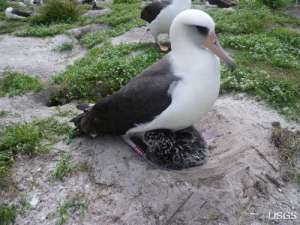
Courtesty USGS
An irresistible press release popped up in my inbox this morning. Last month, a U.S. Fish and Wildlife Service biologist spotted this Laysan albatross on the world’s most remote coral atoll, smack in the middle of the Pacific near Hawaii. The bird was first tagged by the U.S. Geological Survey (USGS) in 1956, when she was estimated to be about five years old. That means today, she’s at least 60 — the oldest known living wild bird in the U.S.
Aptly named Wisdom, the albatross was found hanging out in the Midway Atoll Wildlife Refuge to raise a chick she had recently hatched. Bruce Peterjohn, head of the USGS North American Bird Banding Program, estimates Wisdom has probably raised between 30 and 35 birds in her lifetime. After years of courtship, albatross mate for life, lay about one egg per year and take another year to raise their hatchlings.
About her travel habits, USGS writes:
Almost as amazing as being a parent at 60 is the number of miles this bird has likely logged – about 50,000 miles a year as an adult – which means that Wisdom has flown at least 2 to 3 million miles since she was first banded. Or, to put it another way, that’s 4 to 6 trips from the Earth to the Moon and back again with plenty of miles to spare.
How do they do it? When they’re not nesting, albatross don’t touch land; they actually sleep while they’re flying. Unfortunately, their mobility hasn’t given them much of an evolutionary edge. Nineteen of 21 albatross species are now endangered, due to poisoning of chicks from lead paint that remains on Midway Atoll, longline fishing, invasive species, and the inadvertent consumption of marine garbage.
According to a 2006 article in the LA Times, of the 500,000 albatross chicks born annually on Midway, some 200,000 die from starvation or dehydration, the result of eating plastic refuse that regularly washes ashore there. A lot of it comes from the infamous Eastern Garbage Patch, a huge swath of garbage between San Francisco and Hawaii that has become a symbol of our polluted oceans.
And on that note — come on, you knew this was coming! — a little Coleridge:
‘Is it he?’ quoth one, ‘Is this the man? / By him who died on cross, / With his cruel bow he laid full low / The harmless Albatross …
The other was a softer voice, / As soft as honey-dew: / Quoth he, ‘The man hath penance done, / And penance more will do.’


